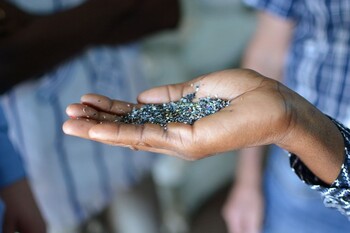Establishing a circular economy – conserving resources, protecting the climate and the oceans
Go Circular global programme
-
Client
German Federal Ministry for Economic Cooperation and Development (BMZ)
-
Co-financier
European Union (EU)
-
-
Political sponsors
More
-
Runtime
2022 to 2029
-
Involved
United Nations Environment Programme (UNEP), NDC Partnership, Ellen MacArthur Foundation
-
Products and expertise
Climate, environment, resource efficiency

Context
The circular economy aims to preserve the value of products, materials and resources for as long as possible. It therefore offers an alternative that stands in direct contrast to the current linear economic model in which products are manufactured at considerable expense and then disposed of after a short period of use. In a circular model, products and materials are designed from the outset to be reusable, repairable and later reused or efficiently recycled, thereby conserving resources and reducing waste. At the same time, new business models and jobs are created.
Objective
Circular economy approaches are widespread around the world and are being implemented in selected countries.
 © GIZ
© GIZApproach
The programme has three priority areas:
- Promoting innovation: Advising companies, associations and public institutions on innovative technologies and business models. It also promotes new approaches and ideas by holding innovation competitions.
- Scaling up solutions: Sharing proven solutions and adapting them to local contexts by working with public and private actors. These solutions include business models designed to prevent waste.
- Action in global alliances: Working closely with international initiatives and organisations and running the secretariat of the PREVENT Waste Alliance.
Since April 2025, the programme has also been working with Expertise France on behalf of the European Union (EU). The Switch to Circular Economy in East and Southern Africa (SWITCH-2-CE in ESA) programme aims to promote circular economies in the Eastern and Southern Africa (ESA) region.

Stand: April 2025







